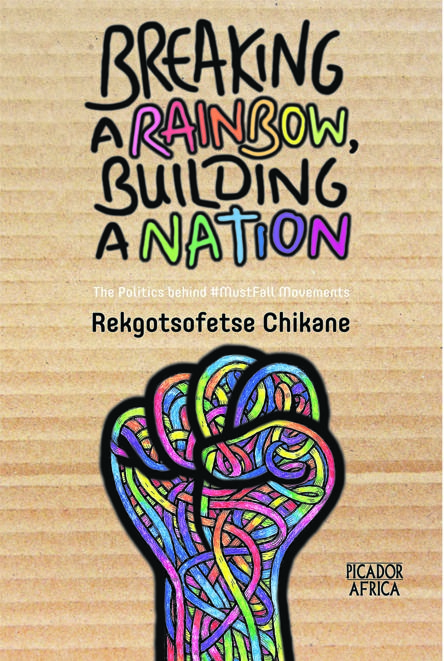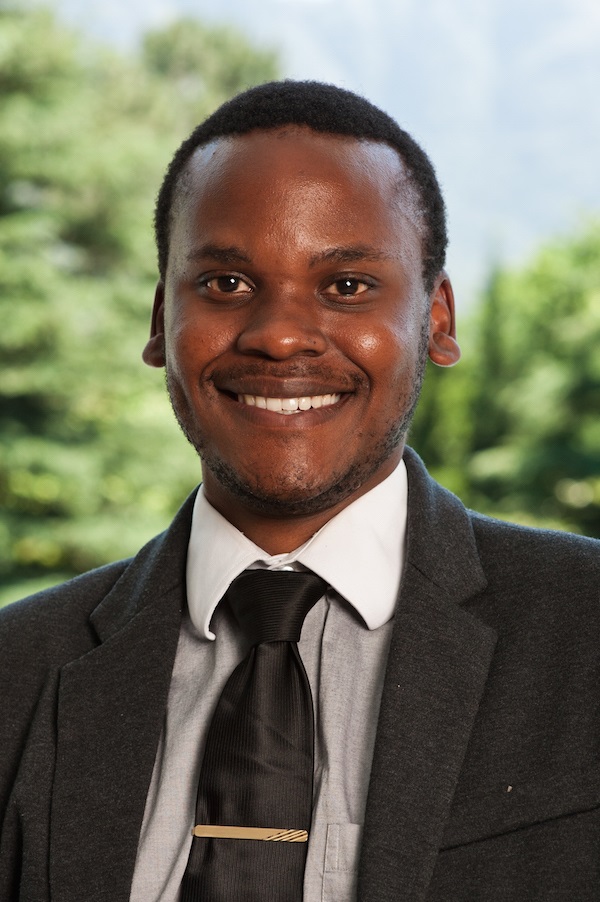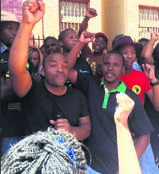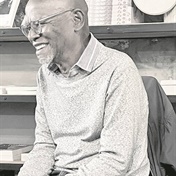
Oxford graduate and student activist Rekgotsofetse Chikane has written an account of the #FeesMustFall protests that rocked SA’s university campuses from 2015 to 2017, as well as about his role in the #RhodesMustFall movement in Cape Town. In this extract, he turns his pen on himself, as a young leader of relative privilege.
Breaking a Rainbow, Building a Nation – The Politics behind #MustFall Movements by Rekgotsofetse Chikane
Picador Africa
264 pages
R245 at takealot.com
I don’t want to give the impression that #FeesMustFall was a coconut revolution.
This certainly was never the case and would be an insult to the many students who sacrificed their futures for the belief that they could change the lives of others. #MustFall movements, through the essence of their motives to achieve economic freedom in our lifetime, cannot and should not be considered a coconut revolution.
However, to deny the influence of coconuts and the black elite, both political and economic, within the movement would be to pretend that snakes don’t hide in tall grass. We don’t lie in wait because we want to betray the masses; we lie in wait because we can. We have been trained to do it our entire lives. It protects us from the glare of a post-apartheid society while affording us the opportunity to prowl South Africa’s post-1994 society unnoticed. Benefiting from the certain privileges it creates for us, while avoiding most of its worst consequences.
That being said, though we coconuts have been afforded the privilege to mask ourselves under the guise of being “not one of those blacks”, we still simultaneously face some of the realities of being “one of those blacks”.
Our proximity to privilege, and whiteness, can also imbue us with a need to preserve it. We have been given a bite of true economic freedom in our lifetime, even though we know it remains a tasteless mirage. A mere illusion of the senses created to numb us from the pain of the reality of our society. From rooftop drinks in Sandton, dinners at the One&Only hotel at the Waterfront in Cape Town, to embracing the gentrification of Maboneng in central Johannesburg, we embrace a world that, only a few short decades ago, would have been unimaginable. Spaces that provide a window into an existence that was reserved for a few.
It would be a mistake to underestimate how much one would do to remain in a fantasy rather than return to reality and take the brunt of it. It is a dilemma not unique to coconuts or the black elite. If you were offered the opportunity to enjoy true freedom and all the fruit it bears, but you knew that failure to grasp it meant to enjoy nothing at all, where would this place you? How badly would you fight to ensure that, even if all was lost in your attempts to achieve complete freedom, you could still return to life in your mirage? In fact, would you even know that you were trying to return at all?
But, unlike other groups who compete for the soul of the #MustFall movements, we hide in the tall grass, hoping that no one sees us, yet banking on the knowledge that enough people can sense our presence.
We unconsciously influence #MustFall politics to protect our self-interest under the impression that our acts are for the greater good. The presence of a bigger villain allows the gaze to turn away from us. We are asked questions we’re never truly expected to answer and, as a result, in the same way that we traverse our post-apartheid society, coconuts chart the landscape of #MustFall politics; cautious, conniving, curious and always cunning.
It is difficult to see ourselves as the enemy because we barely make it apparent even in our own eyes.
Ironic as this might sound coming from me, I believe the urge to be jailed for your cause should undergo some interrogation. This is not to say that being detained for a cause should be a demerit. I am not saying here that those who were jailed were there for the fame and acclaim, although I also wouldn’t say it’s impossible either. However, people who actively seek to be jailed have either been jailed before and have no qualms about returning, or they have a get-out-of-jail-free card in their back pocket.
Either way, their enthusiasm to be jailed should be a warning sign rather than a quality instinctively to be admired.
In my experience, the ones who have the get-out-of-jail-free card are the ones who are the keenest to be arrested. The card comes in various forms.
For some, it’s the possession of a political surname, knowing that you have the means to pay your bail, understanding how an arrest will or will not affect your future job prospects, scholarships and/or bursaries, or simply knowing that, in the event of a trial, you will be able to handle the long and arduous process. For others, it is simply not having to truly worry that your personal incarceration will impede the ability for your family to unshackle itself from its economic bondage.
The threat to #MustFall movements by coconuts and the black elite is neither direct nor upfront. It is cerebral. Like any good poker player, we never reveal our cards, unless we intend to. We influence the natural logic of these movements in such a way that their actions will not jeopardise our own ability to achieve economic freedom on our own accord. Our self-interest nurtures a desire to utilise both our access to resources and proximity to whiteness to maintain and grow our endowment of privileges.
Whether it is through their ability to take control of plenaries, to provide resources to the movement, or as part of the silent majority of the silent majority, the black elite use their unique position in society to reinforce their need to achieve their own economic advancement. We are subtle in our influence but pervasive in our overall effect.
I came across this subtlety in an interesting conversation I had during #RhodesMustFall in 2015. The conversation brought to light the role of the black elite and coconuts in the movement, and the influence they were beginning to have on decisions that were made. It took place during one of the more uneventful plenary sessions in the first few weeks of the occupation of Azania House. The session concerned logistics. I was pulled aside by someone I didn’t know at the time who whispered that #RhodesMustFall was classist. Surprised at the blunt nature of her comment, I pressed her to explain. She went on to say that it made absolutely no sense to hold a plenary meeting on a Sunday afternoon. Realising that I was firmly in her cross hairs of criticism, I trod lightly as I let her continue.
In my mind, the only group that should have felt aggrieved by the time and date of plenary that day were the Christians.
The majority of #RMF on-the-ground supporters and protest cows were somewhere along the spectrum of being Christian. They went from Christian in name only to full-on fundamentalists.
Most kept their staunchest views to themselves, so long as the movement maintained the veneer of a Christian aesthetic. This would later change due to the utterances by Zizipho Pae, a prominent student leader at the time. She made a Facebook post about the US Supreme Court’s decision to legalise gay marriage. She described the decision as institutionalising and normalising sin. It was a student like her, I thought, who would be the most aggrieved by the scheduling of the plenary on a Sunday. I was wrong in this instance.
It was a sobering moment when my companion explained how it was absurd that those who organised the plenary and knew how these sessions often lasted for hours longer than scheduled, still organised them on the day on which Cape Town’s public transport system came to a halt. Apparently, the organisers of plenary meetings had either never taken public transport on a Sunday, or they lived in one of the university residences, or they had access to a vehicle. It should be noted that none of the above makes you one of South Africa’s black diamonds. Instead, it entails that you enjoy a level of socioeconomic leverage not available to most South Africans and, in particular, most students. Socioeconomic leverage that more often than not seems to mimic class – hence my companion’s allegation.
This conversation forced me to think about how often decisions made by those with socioeconomic leverage influenced the logistics, motives and overall direction of the movement. Was there a difference between those students who arrived at a protest with a car and those who travelled there by public transport? Or a difference between a protester from one of South Africa’s top private schools and one from a school that still had pit latrines? How do these disparate groups come together to fight the same economic battle?
Should they even trust each other? Or is trust a necessity at this point rather than a desire?




 Publications
Publications
 Partners
Partners










